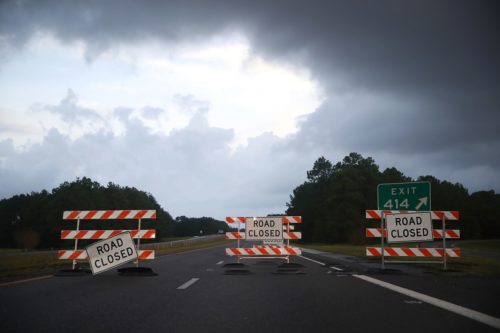Has Hurricane Florence Destroyed Records of America’s Slave Trade?
Share
Explore Our Galleries
Breaking News!
Today's news and culture by Black and other reporters in the Black and mainstream media.
Ways to Support ABHM?
by Sophie Yeo, Standard Pacific
North Carolina’s archivists are worried that fragile collections of documents, covering centuries of history, could have been destroyed by Hurricane Florence.

A highway outside Wilmington, North Carolina, on September 17th, 2018. (Photo: Mark Wilson/Getty Images)
Forecasters have predicted that the storm could cost up to $60 billion in economic damage, as people lost their homes, cars, and possessions to rainfall and flood water when the hurricane hit the eastern coast of the United States. But it’s harder to place a dollar value on the loss of North Carolina’s historic archives, which trace, among other things, the history of the slave trade and, later, Southern systems of racial segregation.
Some archival collections are housed in well-protected university libraries, while others are located in courthouses and historic buildings. Courthouses in particular are vital because they contain property records—and prior to the abolition of slavery in the U.S., that included people. For many African Americans, these property records are the only way they have of tracing their family history….
Archivists fear especially for Wilmington, an historic port city, which suffered extensive damage as Florence cut it off from the outside world with flooding and fallen trees. Given that Wilmington has been a center of commerce, the archives stored there are important in studying the flow of slaves into the state. The town also played a pivotal role in the history of segregation in the U.S., when it became the site of a deadly coup by white supremacists in 1898—a revolt that heralded the start of the Jim Crow era and caused the deaths of up to 60 black people who had built up successful businesses and political careers following the Civil War….
That’s because, as floodwaters subside, a greater peril for fragile archives sets in: mold. About 1.7 million people were ordered to evacuate ahead of the storm, plenty of archivists among them. As they struggle to return to their homes—let alone to the archival collections in their care—documents will start to decay, rendering unsalvageable archival material that could have been restored had it faced only flood water….
Read the full article here.
Read more Breaking News here.
View more galleries from the ABHM here.











Comments Are Welcome
Note: We moderate submissions in order to create a space for meaningful dialogue, a space where museum visitors – adults and youth –– can exchange informed, thoughtful, and relevant comments that add value to our exhibits.
Racial slurs, personal attacks, obscenity, profanity, and SHOUTING do not meet the above standard. Such comments are posted in the exhibit Hateful Speech. Commercial promotions, impersonations, and incoherent comments likewise fail to meet our goals, so will not be posted. Submissions longer than 120 words will be shortened.
See our full Comments Policy here.